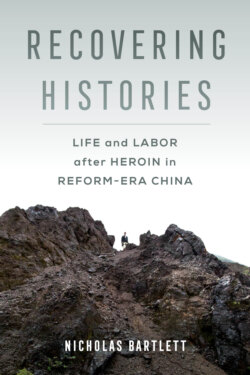Recovering Histories

Реклама. ООО «ЛитРес», ИНН: 7719571260.
Оглавление
Nicholas Bartlett. Recovering Histories
Отрывок из книги
RECOVERING HISTORIES
The Studies of the Weatherhead East Asian Institute of Columbia University were inaugurated in 1962 to bring to a wider public the results of significant new research on modern and contemporary East Asia.
.....
Historicist assumptions, numerous observers have argued, thrived in recent decades in China (e.g., Sahlins 1990; Ferguson 2006). Interactions over the years in China exposed me to the concrete ways that assumptions about development and historical movement appeared in everyday conversations. Acquaintances, including people with heroin use history, on occasion asked me to quantify in years how far the Middle Kingdom was behind the United States. References by Gejiu residents to how Laos or North Korea existed “decades behind” the People’s Republic underscored the commonsense perspective that China was moving in homogenous, linear, and global time. Historical modes of reckoning supplemented by embodied sensations of movement and its absence also appeared in my interlocutors’ descriptions of addiction and recovery.
Meng’s views on his own recovery introduce these themes. I first met Meng just after he had been released from a two-year stint in a compulsory labor center at the office of a grassroots NGO that was part of the Honghe Prefecture drug-user network in a nearby city. His parents had recently passed away, and unusually for someone born before 1980, he had no siblings. With nowhere else to go, the thirty-six-year-old temporarily slept on a couch in the NGO office while working as a volunteer.
.....